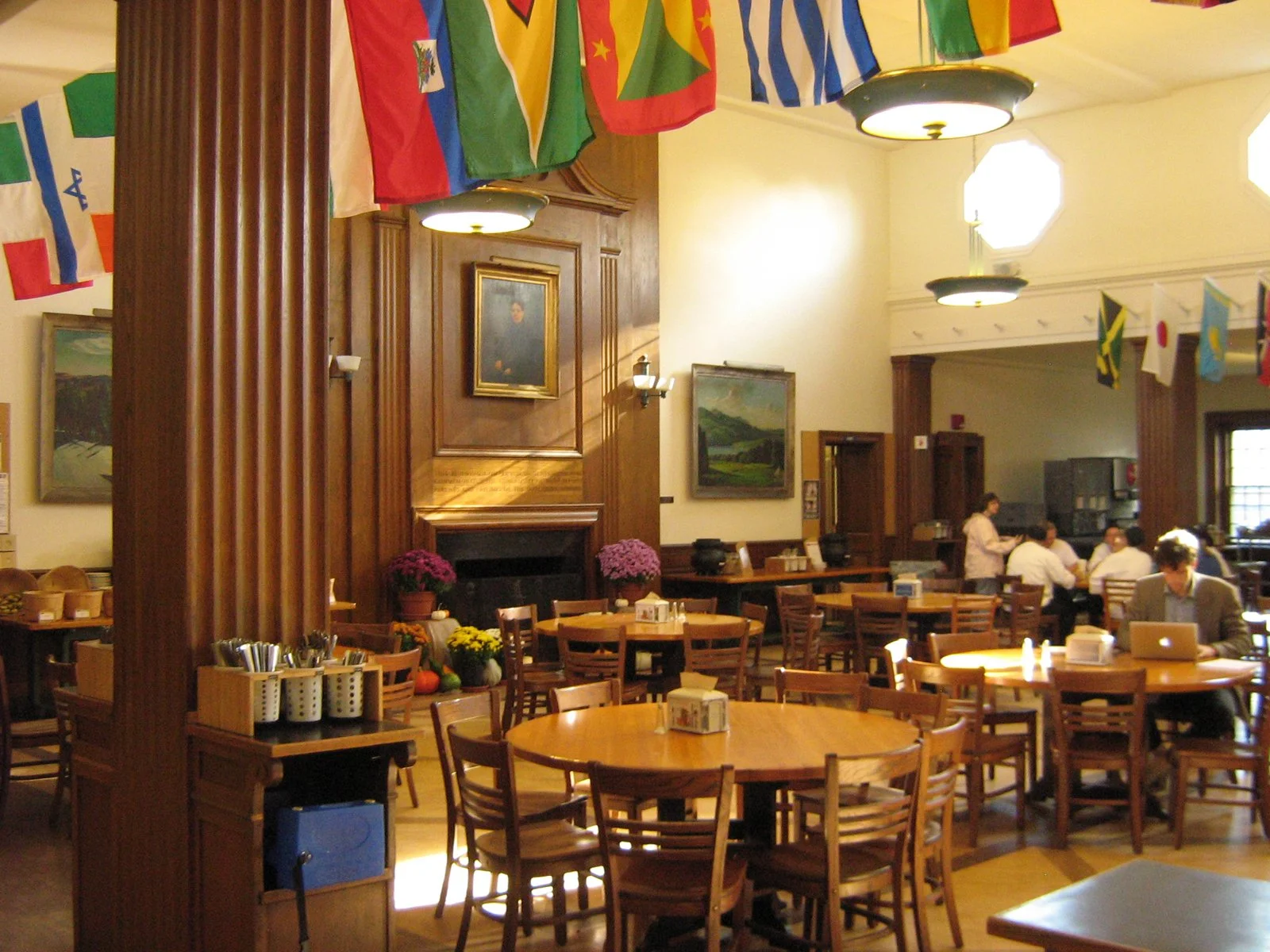inside the hotchkiss dining hall with mike webster
Pulling up in my mom’s Volvo to the Hotchkiss school for my first day of new student orientation, there was an intense anticipation in the air. I was fourteen years old, and in a hurry to see what was waiting for me- the people, the culture, and the atmosphere. I just wasn’t expecting the school to feel so intensely old. There’s a comforting ambiance of age which seems to linger in the background of the Hotchkiss environment, fueled both by the brick buildings built long ago and the traditions carried out from year to year. And, most crucially (in my mind), the dining hall. Sitting in the massive chamber of tables and chairs, surrounded by wooden walls engraved with school award winners from the early 20th century, you get a sense of massive continuity. Gathering in the dining hall to eat and enjoy each other’s company brings us closer in the present day, certainly; but it also roots us in tradition and connects us with the school communities of decades past. The dining hall is, in short, very important.
So, yeah, Mike Webster’s got a lot on his plate.
The Hotchkiss School’s student body contains roughly 600 students. There are hundreds more faculty members on campus. Most people here eat 2-3 times a day from the dining hall, with the exceptions of ordering from local restaurants or purchasing meals from the snack bar. There are a lot of mouths to feed. But, beyond the logistical challenge of managing a residential community’s dining hall, there’s also the task of making food that people enjoy- and, hopefully, making food that can bring people together. I sat down with Mike Webster, the Owner and Director of Dining Services of Tory Hill Foods (which supplies and manages food services at Hotchkiss), to find out more about what food means to him and how he goes about managing the logistical beast that is our dining hall.
Credit: Shanghai Edge Consulting
How did you get started with cooking?
I’ve been a food nerd for a long time. I’ve been working in restaurants since I was thirteen, so food’s just been a huge part of my life. I went to college for food, I studied food- I trained with a lot of fancy angry European chefs when I was younger, so I had a really good restaurant experience as a young person, and then went to college for it, and I’ve been in higher education and institutional food ever since.
What was that first experience like when you were thirteen?
I was a prep cook. I told my dad I didn’t want to go to camp, so he told me to get a job. It was just an American restaurant, you know? Bar, grill, burgers, fries, salads, things like that. For a couple months there, I was a prep cook, and just did what I was told, and diced and chopped.
The million-dollar question: what’s so great about food?
I love the way it connects people. Everybody eats. The food, the history, the culture. I love the alternative history of food… the way things truly happened, and the way food spreads, the way it connects people. That’s why I like food the most. And it’s tasty. I’ll eat absolutely everything.
How did your prior experiences in the restaurant business prepare you for your work today?
I mean, all of them. It’s a culmination of things. I think, young in my career, wanting to work in super high end, fancy French food, and then I went and did it, and I was like, “No thanks.” But I think the product selection is something that I learned a lot of. Learning under French chefs, they’re very specific about every little thing they choose, and I feel like I’m really specific about the things I choose; good, bad, or indifferent. There’s some things that I choose here because they’re really tasty, they’re not healthy, they’re not local… a Tyson chicken tender really is scientifically proven to be more delicious than the others. Even though I’m not so proud of that on an ethical, food [standpoint], it’s really delicious. So, say what you want. You’ve got to pick your battles, what hill you’ll die on. We only ever serve grass-fed beef. So, you all have only ever eaten grass-fed beef. I’m willing to die on that hill. But chicken tenders? Get the good ones. Part of it, for me, is in the product sourcing, but also the community we develop here. Those are the things that make it most interesting for me.
How do you balance the fact that you love food with the fact that you’re on a budget?
I think the biggest challenge… we have a budget that’s reasonable, that’s not too high, it’s not too low, it’s kind of a goldilocks budget. We’re able to bring high value, and we definitely have a premium dining program, the same way that we have a premium education program. But, I absolutely have to answer for the budget at the end of the year. I think where my food passions come out are in the classroom, with the students. Doing the workshops, doing the fun one-offs with kids. Getting to know you guys. Sharing my “nerd-dom” and love for food.
How do you balance student expectations?
I can push the envelope only so far with food. If you, the students, aren’t happy, then I’m not doing so great. So, it’s about finding the balance, giving you a menu that you genuinely like. We try to do simple food done well. That’s the goal… trying to strike the balance of students & adult food preferences. My hope is that we make eighty percent of the people happy every day. It’s not that we’re looking for perfection. We’re still a department that struggles with labor, production, and callouts. You know, it’s a tangible productive environment. I realize you’re not going to be happy every day. I also eat here pretty much as often as you do. I don’t eat breakfast, but I don’t think a lot of you guys eat breakfast either. I get tired of it; I’ve been eating out of an institutional dining room the majority of my life. I get it… but at the same time, I think we really offer a good variety- I can always find something on my own. Today it’s pork stir-fry. I’m not really interested in that. But there’s also braised short ribs in there, and I bet that’s going to make a really great sandwich.
Do you have any stir-fry tips?
I think in general, people kill it with the sauces because they want like a saucier, gravy-er dish. If you use the unsweetened ice tea, it will add some flavor and stretch it out more. The tea will not add salt, and will enhance the flavor, while watering things down to make a final sauce that’s enjoyable. You’re actually adding to the flavor, while reducing sodium.
What’s a good sandwich for you?
I really love kosher, pickled tongue… that makes a really amazing sandwich. Rossi’s [located in Poughkeepsie, NY] is good too…. I love sandwiches. All things in sandwich form.
…
It’s clear from his care for students and love of sandwiches that Mr. Webster isn’t a snobbish chef, or an apathetic one. His eyes light up as he tells me the story of preparing a fantastic egg dish for a friend who’d never had one, relishing the memory of “at 36 years old, to be able to have an ah-ha moment with my friend around something as simple as an egg… for me, food is very much love.” It takes a lot to run a dining hall. It takes a lot to choose meals for an entire student body. Outside of the salt, sugar, soy, paprika, and cumin, one ingredient is essential: culinary compassion. The Hotchkiss dining staff sprinkle it on by the gallon.
You can find more information about Tory Hill Foods and Mike Webster’s work at https://www.toryhilldining.com/.

